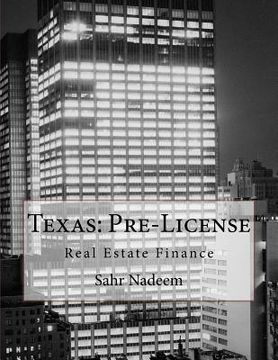Synopsis "Texas: Pre-License: Real Estate Finance"
This course provides an introduction to real estate finance. From qualifying the borrower and qualifying the property in the underwriting process to various types of financing, closing the sale, the Community Reinvestment Act and more, we discuss the monetary systems that control the market, delve into supply and demand, cover housing agencies, and discuss the government influence on real estate. Most real estate is purchased with borrowed money. The methods of real estate finance are many and varied. Making real estate loans carries a certain amount of risk for lenders; for this reason, lenders must have a firm grasp of a borrower's financial qualifications. Lenders consider a borrower's income, credit, debt, source of funds, and net worth. However, no analysis, no matter how thorough, of a borrower's creditworthiness, can be enough to ensure that a loan is completely free of risk. You will learn the methods used by lenders to qualify loan applicants and how lenders qualify the property to be mortgaged. This involves a thorough and accurate property valuation, using the sales comparison or cost approach for residential property and a cap rate or discounted cash flow analysis for investment property. These methods of valuation will be discussed in depth so that you will feel confident and familiar with them when you meet them in the real world. The basics of the financing and the sale process are discussed over two lessons. You will learn how title (abstract ownership rights to the property) is transferred to the buyer with a deed. The earnest money contract will also be discussed: terms of the contract, contingencies, and earnest money deposits. In another lesson, the focus turns to closing. You will learn the customary costs involved in a real estate transaction, how certain items are prorated between the buyer and the seller and the requirements set forth by the Real Estate Settlement Procedures Act (RESPA). This course also covers foreclosure. We consider what happens when a borrower is in default of the mortgage contract and how lenders may help borrowers prevent foreclosure through forbearance, moratoriums, and recasting. Also discussed is how, when these techniques fail, the property is foreclosed and sold at auction and how the creditors are repaid.No real estate finance course would be complete without discussing the types of mortgages available. We have two lessons that will detail the elements of conventional loans, both conforming and nonconforming; adjustable rate; graduated payment; growth equity; and reverse annuity mortgages, to name a few. The advantages and disadvantages of each type of financing are emphasized so that you may better understand the decision-making process inherent in real estate finance. Two specific types of financing, FHA-insured and VA-guaranteed loans, are reserved for separate lessons. FHA loans are insured by the government and perceived as less risky by lenders. They are available to all natural and naturalized U.S. citizens, but they carry a monthly insurance premium that cannot be canceled. VA loans are guaranteed in part by the government, but are available only to veterans, active servicemen, and certain National Guard members and special reservists. The final lesson deals with a topic important to real estate investment: Internal Revenue Code (IRC) Section 1031 exchanges (a k a 1031s). Buying and selling real estate investments can be a tax-heavy business. By "exchanging" their investments under the continuity of investment principle, investors can receive more financing and improve their portfolios. At the end of each lesson, you will be required to complete a quiz for that lesson before moving on to the next lesson. The course ends with a real-world practice lesson that brings together the concepts and material discussed throughout the entire course.

